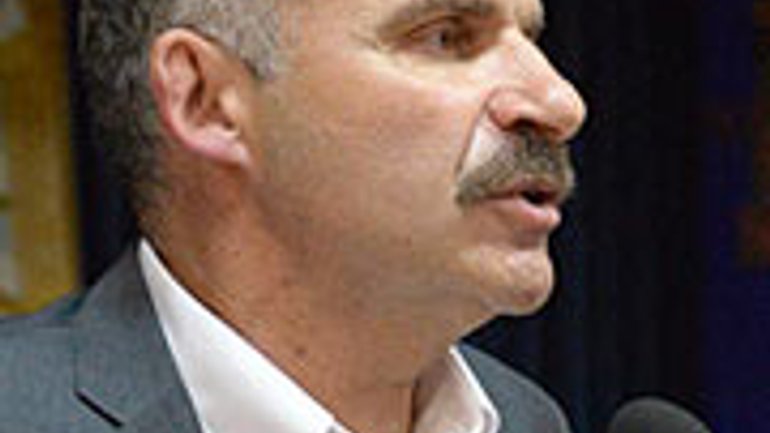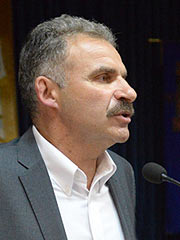Viktor Yelensky: ‘State program of celebrations of 1025th anniversary is a humiliation for millions of Ukrainian Christians and it further divides the country’

 The celebration of the 1025th anniversary of the Baptism of Kyivan Rus by Prince Volodymyr the Great has begun in Ukraine. Even though the date is not very “round,” several dozen million hryvnias were allocated for this celebration for Kyiv alone. The celebration takes place at a high national level: it will be attended by high ecclesiastical dignitaries and presidents of so-called Orthodox countries. Ukrainian churches take part in it as guests, for this is how the state program of celebrations has been put together. By the way, the program includes almost nothing about what happened in 988 in Kyiv – the act of adopting the Christian faith. Instead, the celebrations have been perceived as the beginning of President Viktor Yanukovych’s presidential campaign.
The celebration of the 1025th anniversary of the Baptism of Kyivan Rus by Prince Volodymyr the Great has begun in Ukraine. Even though the date is not very “round,” several dozen million hryvnias were allocated for this celebration for Kyiv alone. The celebration takes place at a high national level: it will be attended by high ecclesiastical dignitaries and presidents of so-called Orthodox countries. Ukrainian churches take part in it as guests, for this is how the state program of celebrations has been put together. By the way, the program includes almost nothing about what happened in 988 in Kyiv – the act of adopting the Christian faith. Instead, the celebrations have been perceived as the beginning of President Viktor Yanukovych’s presidential campaign.
To understand the importance of this celebration for the current political “elite,” we turned to the head of the Ukrainian Association for Religious Freedom, Viktor Yelensky.
— It is obvious that the philosophy of the holiday focuses on strength and power – Jesus Christ is not mentioned at all. Furthermore, national celebrations are organized in a way to narrow the space for the free expression of feelings, attitudes, and beliefs of the people. The organizers likely wanted the celebration to revolve around an “Orthodox president” – a just, devout, and good father of all Ukrainians and worthy successor of Volodymyr the Great. In fact, Putin and Patriarch Kirill find themselves at the center of the celebrations, and other Orthodox hierarchs and “Orthodox presidents” form the background for them.
Leonid Kravchuk understood this well when he refused to go to the prayer led by Patriarch Alexy II involving three presidents on the Ukrainian-Russian-Belarusian borderlands; Leonid Kuchma avoided traps of this kind after the Jerusalem Orthodox Summit in 2000. By the way, in 2008, during the 1020th anniversary of the Baptism, the situation was different: in the center of the celebrations were the Ecumenical Patriarch and the Ukrainian president, which the Moscow Patriarchate was not happy about.
Now it is time for revenge. The guests from Moscow will try to show the greatness of the “Russian world” on its southern edge, and each branch of the regime – secular and religious – will pursue its own interests.
The Ukrainian ruling class is unlikely to receive any dividends from the celebrations, for which it had hoped, especially when one recalls that there are twice as many Ukrainians who are opposed to the manifestation of piety by the ruling class before the cameras than those who are not.
— If you look at the program of celebrations, the major public events revolve around the Moscow Patriarchate. Can the celebration be considered a Moscow Patriarchate holiday in Kyiv?
— The state program of celebrations is a humiliation for millions of Ukrainian Christians and it further divides the country. The government had several options to organize the holiday in a way that it would manifest the unity of Ukraine; instead, the emphasis on the “unity of fraternal peoples” only divides its people. What kind of “unity” is it when millions of Ukrainian Christians are shown their alleged “second rate” status? So, in order to show their affinity with Russians, Belarusians, and Moldovans, some Ukrainians must manifest their aversion to others? This is not the Ukrainian Orthodox Church-Moscow Patriarchate’s scenario; it is a program imposed by the Moscow Patriarchate. Moreover, some elements of the celebration can be considered as pressure on the Kyivan Metropolitanate. Also, I do not think that everyone will be delighted when the Russian president, who called Ukraine a “non-accomplished state,” will carry out an “inspection” in the [Kyiv Cave] Lavra and hand out awards to elected hierarchs and activists.
— Who needs this sort of scenario? And is this not a violation of constitutional norms?
— It is clear that the Russian side needs it – it is not the Baptism of Kyivan Rus but the anniversary of the ROC [Russian Orthodox Church] that is being celebrated (I won’t go into the specifics of the historical (in)validity of this). As for the violation of constitutional principles, one should ask the Constitutional Court. I am sure that it will not find any violations. But seriously, the government is once again trying to undermine the balance that has developed in the religious field of the country. This, at least, is unwise.
— How do you think other churches should handle this situation? Should they again ignore the format of the celebrations?
— Each of the churches has its own – more or less extensive – program for the celebrations. But the state is the initiator of the 1025th anniversary celebration; it, the state, or rather its heads, pursued their own goals, which, of course, had little in common with the teachings of Jesus. The situation could have been different if the Ukrainian Council of Churches and Religious Organizations had taken it into its own hands. But to do it against the will of the state is now almost impossible (as opposed to the 1020th anniversary when the “power vertical” was not as omnipresent and categorical in its desire to trample everything under it). I think that church leaders will find the opportunity to express their attitude toward the format of the celebrations in one way or another.
— Returning to the question about “Orthodox President” Yanukovych, it was believed that this celebration was to be the beginning of Yanukovych’s election campaign. How likely will this happen, and if it does not, why did Moscow deliberately not allow it?
— I do not think that the celebration was thought of as the beginning of the campaign, for it clearly lacks meaning and emphasis. In fact, what does the holiday propose to celebrate? It is not a celebration of a worthy choice. A reminder of the then choice for human dignity, justice, law, and mercy is uncomfortable for the current government, just as is the mention of the European choice. In a complete lack of sense, “literal trains” [special trains for top officials], countless guards, dogs in churches, etc., are making it to the surface. And it is not the journalists who write about this who are to blame.
Obviously, it was done as a sort of big government public-relations campaign, expensive and meaningless, in order to be “cool” and “chic.” The organizers were not concerned that sometimes they acted crudely, but they were afraid to tell the head of the Ukrainian state that he would not bask in the rays of the PR sun.
— So, as the 1020th anniversary celebration was not entirely successful (because the Constantinople Patriarchate’s mission to establish a metropolitanate failed), has this year’s also brought nothing good for Ukraine?
— Five years ago, there was “re-celebration of that which was not celebrated” in 1988. At that time, Moscow was the center of the celebrations, the anniversary had, among other things, a counterpropaganda character, was directed against “bourgeois falsifiers of history,” “nationalist scum,” and took place using great Russian chauvinistic slogans. In 2008, the Ukrainian authorities decided to re-celebrate this anniversary and to some extent it succeeded (despite the significant Byzantine flavor in the behavior of its then heads).
And now, another reversal. Celebrating a “non-round date” would make sense if it contributed to the consolidation of society, re-confirmation of its identity, and moral elevation, and if it was accompanied by significant church and community initiatives. The state could find its place in the celebration in a meaningful way by resolving at least some of the issues from the catalog of problems in church-state relations, issues that the Ukrainian churches have tried to address with the government every year.









